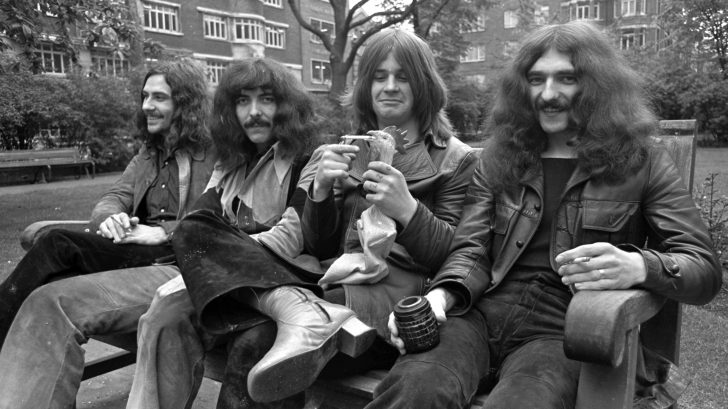In 1970, Black Sabbath burst onto the scene with dense riffs, scary lyrics, and an overwhelming sound.
In 1968 and in Birmingham, everything is to be done. As The Beatles came to the end of their short and intense career and Brian Jones was still a part of The Rolling Stones, guitarist Tony Iommi and drummer Bill Ward roamed the town, renowned in history books for its industrial power when they entered a music house to look at instruments. There they read the poster that would forever mark the history of rock and radio forever: “Ozzy Zig looking for a show, he has his own sound system.” Zig was Osbourne and he was 20 years old.
As with many aspects of life, it all came about by chance and accidental. When Tony Iommi (guitar), Bill Ward (drums), Geezer Butler (bass), and Ozzy Osbourne (vocals) got together for the first time their goal was to create a traditional band like many of the time. What they were looking for was a fusion of traditional rock with a bit of blues and psychedelia.
It was on February 13, 1970, that the Birmingham quartet’s first LP was released. From the cover photo, there is a mysterious aura that many associates with the occult. And it is the opening song, also called “Black Sabbath”, which confirms all the theories. Incidental sounds of rain, thunder, and bells are interrupted by a slow yet hypnotic guitar.
And from that decision making the band was consolidating its sound. Thus came the sinister melodies of guitarist Tony Iommi, which he would not have achieved if he had not lost the tips of his fingers in an accident at the factory where he worked part-time. Iommi was forced to play with homemade thimbles that he designed himself and to choose a lower tuning to facilitate the manipulation of the guitar; Ozzy wrote the lyrics for “Black Sabbath,” the title track for their debut album, evoking a nightmare that bassist Geezer Butler had. After receiving a book on the occult from Ozzy, Geezer saw in his dreams a black shadow at the foot of his bed. When he woke up, the shadow and the book disappeared.
That song was the starting point for recording their debut album, a feat they accomplished in just two days. The work is so forceful, so novel for the time and so current that even today it can boast of dictating the rules of heavy metal. Although there is still a marked influence of the blues on other songs, such as Evil Woman, The Wizard, and NIB, that lower tuning on Iommi’s guitar was key along with the telepathic coordination between bassist Butler and drummer Bill Ward to convey an overwhelming frenzy that distances them remarkably from those roots.
Thus they enter something completely new, reflecting a world decayed by war and broken promises. And it does so from details such as the cover, with the mysterious woman who evoked the shadow that Butler saw in his room and earned them for quite some time the unfounded reputation of being linked to Satanism. Also since deciding that the date to release the LP was February 13 to increase the dark connotations of its proposal due to the numerological meaning traditionally associated with 13.
That 1970, Black Sabbath showed a new horizon to rock, away from the figure of the hippie with acoustic guitar in hand singing to peace and nature, out of the bowels of a city like Birmingham that hardened its inhabitants by their steel pride and their street fights. It was more than blues, a crusade to push the guitar to the limit like Jimi Hendrix had been doing. Definitely, a whole new way of looking at life and conceiving guitar music, whether it was through the riffs of Iommi, the electrifying bass and drums coordination of Butler and Ward, or the thunderous voice of Ozzy, that without a conventional technique he achieved a supremely personal and satanically attractive tone.
The sum of these elements explains the unconditional adherence that the band aroused from the first moment among rock fans. That same year, in September, Black Sabbath’s second album, Paranoid, will be released. There the deal with their new audience was closed and the step to immortality was given, but that is another story …
Although the album was to be called War Pigs at first, the band was pressured by their record company to change it due to the possible rejection they might suffer in an America dismayed by the Vietnam War. Since the gang had no intention of causing controversy in America at the prospect of a possible tour in October, they finally decided to use the title Paranoid. According to their roadies Spock and Luke explained, one afternoon they had to go to Birmingham, the hometown of Black Sabbath, to pick up some replacement amplifiers. Returning to the studio in London for a few hours later, they came across a new song called Paranoid. It wasn’t composed when they left. History says was composed in just twenty minutes to fill a gap of four minutes left on the disc master. In the best case, attending to the distance between Birmingham and London, the band had taken them five hours to compose, record, and produce it, all a record for one of the most timeless classics in the history of Heavy metal.
Tracing the musical origins of metal can lead to many paths. The first indications are in the distorted guitars of Link Wray and The Kinks, also in the amplifiers at maximum volume of The Who and Blue Cheer, in addition to the lyrics with satanic references such as “I Put A Spell On You” by Screamin ‘Jay Hawkins. But the first band in history that brought together all the mentioned elements and gave rise to the heaviest subgenre of rock was Black Sabbath.

